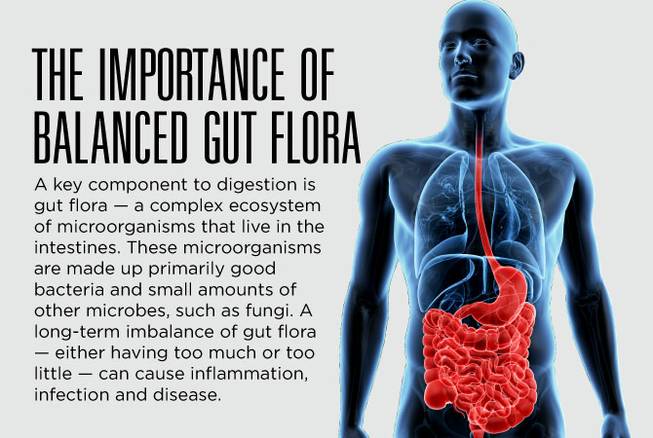
Monday, June 19, 2017 | 2 a.m.
The gut is a powerhouse within the body — it converts food into energy, delivers valuable nutrients into the bloodstream, manages waste and protects against disease.
In fact, the gut is an intrinsic link to bettering our overall health and wellness. “Each of us has significant control over our own gut health, but often people do not take the time to consider it until they’re not feeling well,” said Snehal Desai, MD, gastroenterologist at Sunrise Hospital and Medical Center.
While it may be easy to overlook, taking proactive steps to promote a healthy gut is one of the best tools we have for preventing disease and optimizing our larger sense of well-being.
What does the gut do?
“The gut” refers to the entire gastrointestinal tract. It starts at the mouth, travels through the esophagus, stomach, small intestine, large intestine/colon, and ends at the anal canal/rectum.
“The role of the gut is extensive,” Desai said. “It is involved in many housekeeping-type functions but its main responsibility is digesting food. Digestion is both a mechanical and chemical process.”
The mechanics of digestion occur largely in the mouth and the stomach by physically breaking down food into smaller particles. The chemicals used during digestion — including a variety of enzymes, acid and bile — aid in the mechanical breakdown of food and, more importantly, they allow the body to absorb nutrients and expel waste.
The nutrients absorbed during digestion fuel every organ in the body and their respective functions. Further, approximately 70 percent of the immune system is ruled by the gut. “Hippocrates himself said that ‘all disease begins in the gut,’ ” Desai said. “The intestinal tract forms a defensive barrier from what we ingest and it prevents harmful substances from reaching the bloodstream. If this barrier is compromised and those harmful substances are able to get past, inflammation can occur.”
Inflammation can negatively affect the body in many ways and is associated with the development of chronic conditions, including arthritis, diabetes, kidney disease and colitis, among others.
The importance of balanced gut flora
A key component to digestion is gut flora — a complex ecosystem of microorganisms that live in the intestines. These microorganisms are made up primarily good bacteria and small amounts of other microbes, such as fungi.
The large intestine houses high quantities of gut flora, which serve to “further break-down indigestible foods, produce valuable substances like vitamins and fatty acids, and contribute to several biochemical processes within the colon,” Desai said.
The number of microorganisms found within the intestines can be affected by diet, age, existing health conditions and certain medications (including antibiotics and steroids). However, a long-term imbalance of gut flora — either having too much or too little — can cause inflammation, infection and disease.
Common diseases of the gut
“Our gastrointestinal tract can be afflicted by numerous conditions including gastro-esophageal reflux disease (GERD), gallstones, celiac disease, Crohn’s disease, ulcerative colitis, irritable bowel syndrome (IBS) and hemorrhoids,” Desai said.
These conditions can come with a wide variety of symptoms, including pain, heartburn, diarrhea, constipation, nausea, bloating, weight gain/loss and fatigue, depending on the patient and his or her specific disease.
Desai recommends seeing a doctor whenever you experience any symptom that affects your daily life, disrupts your digestion and/or causes any sudden or ongoing pain in the abdomen.
Tips for a healthy gut
1. A healthy diet is extremely important for gut health. Strive to hit the daily recommended amount of fiber (25 grams), minimize red meat intake and eat fruits and veggies.
2. Exercise regularly. “Even just 20 minutes of walking, three times a week, will do wonders,” Desai said.
3. Limit refined sugar and carbohydrates as much as possible. High-sugar intake is associated with a host of serious diseases and can disrupt your gut flora balance.
4. Avoid bad habits such as smoking, drinking soda and overindulging in alcohol.
5. Drink at least eight glasses of water every day.
6. If you have known food allergies or intolerances, be respectful of them and don’t push your body’s limits.
7. Be predictable with your body — eat a steady diet, have meals at the same time every day, get on a consistent sleep schedule and exercise on a routine. “Our bodies like consistency. Do the same basic things each day and your body will thank you for it,” Desai said.
8. Talk to your doctor about probiotics (especially if you’ve been taking antibiotics or steroids) to supplement any imbalances in your gut flora.

Join the Discussion:
Check this out for a full explanation of our conversion to the LiveFyre commenting system and instructions on how to sign up for an account.
Full comments policy